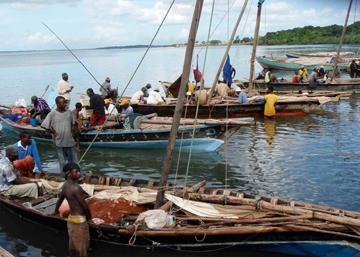“Middle class” villages in Africa are more likely to deplete their fisheries than poor- and wealthy communities, reports a new study published in Current Biology.
The findings are based on analysis of “reef systems, human population densities, and socio-economics among villages in 30 fished and unfished study sites in five countries along Africa’s Indian Ocean coast”. Researchers from James Cook University, the Wildlife Conservation Society (WCS), and the University of East Anglia conducted the research.
A statement from WCS explains:
-
The explanation, said researchers, lies in the interplay between traditional customs and how growth influences the social fabric of communities. In poor communities, many of which rely heavily on marine resources, fishing levels are kept in check by local cultural institutions and taboos and a reliance on traditional, low-tech fishing methods. Increases in wealth often reduce a community’s dependence on fishing, but it can also increase the number of motorized fishing vessels and fishing gear such as handlines.
 Photo © Tim McClanahan |
Economic growth during the early stages can also erode cultural restrictions on overfishing, according to the authors. The net result: fewer fish. Among the countries studied, Kenya in particular, has experienced a sharp decline in cultural restraints and a subsequent increase in unrestrained and destructive fishing techniques.
The most affluent communities, by contrast, become less dependent on marine resources and more diversified economically, with more salaried positions and economic opportunities. Wealthier communities also possess higher levels of technology—larger boats that enable fishermen to fish on the open sea—and an increased awareness on the importance of coral reefs on ecological health.
The study also found that marine sites with no fishing had three times the number of fish as sites where fishing was allowed.
“This is a significant finding on how socio-economics can influence reef fisheries in surprising ways,” said Dr. Tim McClanahan, a WCS coral researcher and co-author of the study. “It also shows the importance of combining ecology with social science for conservation planning on a regional scale.”
“Coral reef fishery management will depend not just on fishing laws but also on improving human welfare and institutional capacity through appropriate socioeconomic development,” he continued. “Governments, donors, and other agencies help communities avoid ‘poverty traps’ through investments in programs and alternatives to reef-based livelihoods, where obvious examples include infrastructure developments such as schools and hospitals.”